

The Guardian - After Scotland, now it's Catalonia's turn. Carles Castillo can't win.
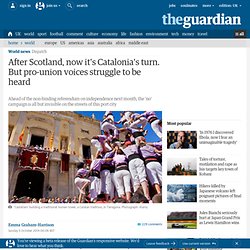
In Catalonia the outspoken local politician is derided as a feeble sellout for opposing total independence; in the rest of Spain he is damned as a rabid separatist for wanting a bit more self-governance. "I feel like I am being bombarded from both sides," says Castillo, strolling through the port district of his much-loved home city, Tarragona, where he is keen to point out a Roman amphitheatre, a fleet of fishing boats and the busy harbour beyond.
Fast-growing separatist sentiment in Catalonia has risen to fever pitch with the prospect of a referendum on 9 November, even though the results would be non-binding and the poll is technically on hold while the national constitutional court decides if it is legal. On crash barriers and underpasses in provincial towns and on banners in the heart of Barcelona, graffiti in the Catalan language demand "Liberty for Catalonia". In September more than 1.8 million people turned out for a march demanding independence. Ukrainian rebel leader’s criticism of Scottish independence results mysteriously retracted. A lone YES campaign supporter walks down a street in Edinburgh after Scotland voted against independence.
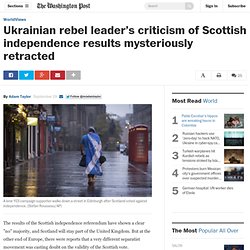
(Stefan Rousseau/AP) The results of the Scottish independence referendum have shown a clear "no" majority, and Scotland will stay part of the United Kingdom. But at the other end of Europe, there were reports that a very different separatist movement was casting doubt on the validity of the Scottish vote. "I can't exclude the possibility that the British authorities have falsified the results of that referendum, as the difference between those who voted for independence and against it isn't too big," Miroslav Rudenko, a key leader in Ukraine's pro-Russian rebels, said in comments carried by Interfax on Friday.
"This means a few percent might have been massaged in in favor of British unity. " Assessing a possible Scottish secession. In recent days, polls suggest that the “yes” side has a real chance of winning next week’s referendum on Scottish independence from the United Kingdom.
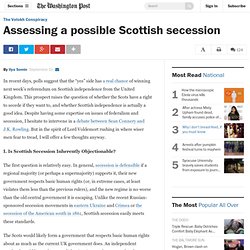
This prospect raises the question of whether the Scots have a right to secede if they want to, and whether Scottish independence is actually a good idea. Despite having some expertise on issues of federalism and secession, I hesitate to intervene in a debate between Sean Connery and J.K. Rowling. But in the spirit of Lord Voldemort rushing in where wiser men fear to tread, I will offer a few thoughts anyway. I. The first question is relatively easy. The Scots would likely form a government that respects basic human rights about as much as the current UK government does. Many Scottish nationalists, of course, justify independence not on grounds of individual choice, but on ethnic solidarity and cultural self-determination. II. Like Slovakia, an independent Scotland might adopt more free market policies out of necessity. Irish seem lost for words on Scottish independence. Official Ireland, in the form of governments North or South, is not in proselytising mode.
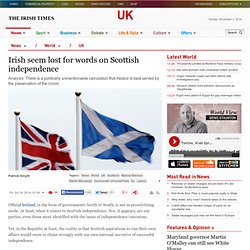
At least, when it comes to Scottish independence. Nor, it appears, are our parties, even those most identified with the cause of indepenedence/unionism. Yet, in the Republic at least, the reality is that Scottish aspirations to run their own affairs would seem to chime strongly with our own national narrative of successful independence. At the very least one might expect a chorus from sympathetic politicians of “been there, done that”, an expression of solidarity for the legitimacy of a nationalist aspiration, and an articulation the core national value of the right of nations to self-determination.
At least, perhaps, a reassuring response and assurance out of our historical experience to the prognoses of catastrophe, of economic disaster and political isolation that have emanated from Westminster? Political maths. U.S. remains a wild card in Scottish independence vote. But there has been conspicuous silence from one major player with a lot to lose if Scotland secedes: the United States.
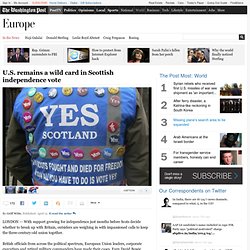
A vote for independence would dismember Washington’s closest and most important ally, leaving behind a not-so-great Britain at a moment when Russia is waging the stiffest challenge to Western authority in a generation. Although any separation after the Sept. 18 referendum would be peaceful, it would trigger years of messy negotiations over the future of the British nuclear weapons program, North Sea oil reserves and the pound. Former NATO secretary general and British defense minister George Robertson said in a speech in Washington this past week that for the United Kingdom to “shatter this year would be cataclysmic.” Even with such high stakes, the Obama administration has stayed on the sideline, insisting that “the future of Scotland is an internal matter.” Analysts say a strong American statement could tilt the balance in a tight vote.
Security implications. 2014: The year referendums reshaped the world. A sign welcoming motorists to Scotland at Berwick Upon Tweed, England, Monday, Sept. 8, 2014.
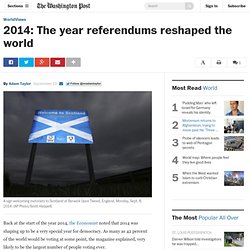
(AP Photo/Scott Heppell) Back at the start of the year 2014, the Economist noted that 2014 was shaping up to be a very special year for democracy. As many as 42 percent of the world would be voting at some point, the magazine explained, very likely to be the largest number of people voting ever. The obvious example of this democracy in action was India, where 814.5 million people were eligible to vote in one of the largest elections in history. That election's dramatic result is surely an important point in history, but in hindsight, it looks like general elections may not be the votes that matter most in 2014.
Instead, it looks like referendums – those rare votes on single issues – are what has really reshaped the world this year. In just eight days, Scotland will have a referendum on whether to become an independent country and leave the United Kingdom.